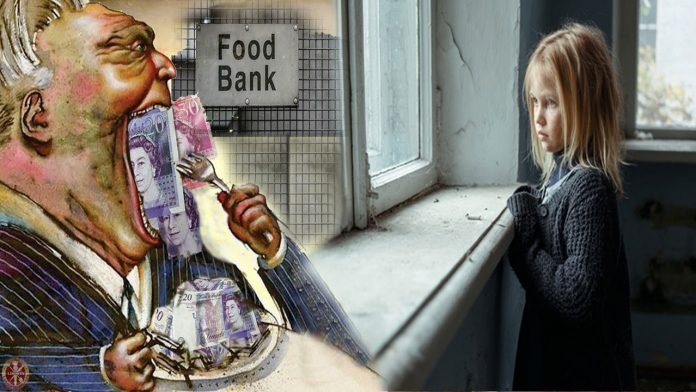
Study finds more than one in five children of workers employed in the frontline of the pandemic live below breadline
The report, produced by Landman Economics, used the government definition for key workers and found that over a million children of key workers across the UK live below the poverty line.
The trade union federation general secretary Frances O’Grady declared that “every key worker deserves a decent standard of living for their family, but too often their hard work is not paying off like it should”.
“The Prime Minister has promised to ‘build back fairer’. He should start with our key workers. They put themselves in harm’s way to keep the country going through the pandemic. Now, we must be there for them too,” she said.
“This isn’t just about doing right thing by key workers. If we put more money in the pockets of working families, their spending will help our businesses and high streets recover. It’s the fuel in the tank that our economy needs.”
The research found that in some areas more than a quarter of children in key worker households are living in poverty, with the North East of England showing the highest rate at 29%.
The North East is followed by London (27%), the West Midlands (25%) and Yorkshire and the Humber (25%). In total, the study found that there are 1,062,586 children of key workers living in poverty across the country.
In the East Midlands, the rate matches the national average with 21% in poverty. That number is higher in the West Midlands (25%) and highest in the North East (29%).
The TUC claim the main reason for poverty in the families of key workers are low pay and insecure hours.
The TUC said that as well as pay and hours, high housing costs were reducing the amount of money key worker households could spend on groceries and utility bills. Support through universal credit, due to be cut by £20 a week in the autumn after a temporary pandemic uplift, was not enough to guarantee that families avoid poverty.
Current government policies were likely to increase child poverty rates, because as well as cutting universal credit ministers had capped pay rises for key workers in the public sectors, leading in some cases to cuts in wages when adjusted for inflation.
The TUC said these policies would put brakes on Britain’s recovery, because curbs on household spending would restrain business activity and have knock-on effects on wage growth for other workers.
Both Conservative MPs and Labour have urged the government to rethink the £5bn cut, while charities have warned that the decision will hit six million households across the country and push 200,000 more children below the poverty line.
The TUC has warned that the Universal Credit cut along with the public sector pay cap will likely worsen child poverty rates and “put the brakes on the nation’s economic recovery by curbing household spending”. It has called on ministers to:
- Raise the national minimum wage to £10 per hour immediately;
- End the public sector pay freeze give all public service workers a decent pay rise;
- Give outsourced public sector workers a real living wage and ensure parity with directly employed staff;
- Cancel the planned cut to Universal Credit; and
- Set out plans to increase child benefit above inflation each year this parliament.
According to the Child Poverty Action Group, 4.3 million children were living in poverty in the UK in 2019-20. This represents 31% of all children or nine in a classroom of 30. The figure for children in single-parent households was 49%.
The campaign group found that 75% of children growing up in poverty lived in a household where at least one person is in employment and that children from large families or from Black and minority ethnic groups were more likely to be in poverty.
TUC Midlands Regional Secretary Lee Barron said: “All our key workers in the East Midlands deserve a decent standard of living for their family. But too often their hard work is not paying off like it should. And they struggle to keep up with the basic costs of family life.
“The prime minister has promised to ‘build back fairer’. He should start with our key workers. They put themselves in harm’s way to keep the country going through the pandemic. Now, we must be there for them too.
“This isn’t just about doing right thing by key workers. If we put more money in the pockets of working families, their spending will help our businesses and high streets recover in the East Midlands. It’s the fuel in the tank that our economy needs.”
Help Us Sustain Ad-Free Journalism
Sorry, I Need To Put Out the Begging Bowl
Independent Journalism Needs You
Our unwavering dedication is to provide you with unbiased news, diverse perspectives, and insightful opinions. We're on a mission to ensure that those in positions of power are held accountable for their actions, but we can't do it alone. Labour Heartlands is primarily funded by me, Paul Knaggs, and by the generous contributions of readers like you. Your donations keep us going and help us uphold the principles of independent journalism. Join us in our quest for truth, transparency, and accountability – donate today and be a part of our mission!
Like everyone else, we're facing challenges, and we need your help to stay online and continue providing crucial journalism. Every contribution, no matter how small, goes a long way in helping us thrive. By becoming one of our donors, you become a vital part of our mission to uncover the truth and uphold the values of democracy.
While we maintain our independence from political affiliations, we stand united against corruption, injustice, and the erosion of free speech, truth, and democracy. We believe in the power of accurate information in a democracy, and we consider facts non-negotiable.
Your support, no matter the amount, can make a significant impact. Together, we can make a difference and continue our journey toward a more informed and just society.
Thank you for supporting Labour Heartlands











